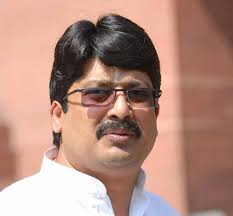New Delhi, October 11: Congress vice president Rahul Gandhi’s strong backing for the Supreme Court-led reforms of the criminalisation of politics seems to have little impact on his own party’s alliance partners. Eight months after he was forced to resign over his alleged involvement in the murder of a senior cop, controversial Uttar Pradesh politician Raghuraj Pratap Singh alias Raja Bhaiyya was sworn in as a minister in the Akhilesh Yadav government on Friday morning.
It is evident that power and caste politics still takes a precedent over all other considerations in the hinterland.
Raja Bhaiyya, an Independent MLA from Kunda Assembly constituency in Pratapgarh district, had to resign as food and civil supplies minister in March this year after his name cropped up in the FIR filed after the murder of police officer Zia-ul-Haq, a deputy superintendent of police who was posted as circle officer in Kunda. On March 3, Haq was killed by a mob, which his widow Parveen Azad alleged, acted at Raja Bhaiyya’s behest.
Though the CBI gave clean chit to Raja Bhaiyya last month, Haq’s widow has filed a protest application against it.
Raja Bhaiyya, who brings in the critical Thakur votes for the SP, wields considerable influence over five assembly constituencies in Pratapgarh and many other in the adjoining areas. It has been observed that when the don-turned politician is present in election rallies in the region, the actual candidate may never speak, and are not even mentioned in his speeches at times.
It’s not for the first time that the Samajwadi Party has realised the indispensability of Raja Bhaiyya in the state Cabinet. One of the first decisions that the Akhilesh Yadav government in UP took after taking charge in March 2012 was to bring Raja Bhaiyya out of prison and ironically make him the minister in charge of prisons. Earlier, when the Mulayam Singh Yadav government came to power in the state in 2003, all the Prevention of Terrorism Act (POTA) charges against Raja Bhaiyya were dropped in just 25 minutes of the government taking charge. The Supreme Court later intervened and barred the state government from dismissing POTA charges. Eventually the POTA was repealed in 2004, and although the court again refused to release Raja Bhaiyya, he subsequently became a powerful man in the government.
Criminal cases against Raja Bhaiya are just ordinary matters. As of now, he faces eight criminal cases, including those of attempt to murder, robbery and dacoity. In the past 20 years of his existence in Uttar Pradesh politics, Raja Bhaiyya has divided his time between jail and council of ministers, depending on who held power in the state. In the interim, his brand of politics has only risen.
In 1997, 1999 and 2000, Raja Bhaiyya was made a minister in the BJP governments of Kalyan Singh, Ram Prakash Gupta and Rajnath Singh respectively. In the 2004 elections, he changed his stand and began supporting the Samajwadi Party which made him minister in the 2004 Mulayam Singh Yadav government and the 2012 Akhilesh Yadav government. In March 2013, he had to resign from the state Cabinet after he was booked for the murder of DSP Haq.
The muscleman-turned-politician’s sudden entry into the ministry is a well-calculated move of the Samajwadi Party to regain some of the ground lost in the wake of the recent Muzaffarnagar riots. Despite his notoriety, the Samajwadi Party hopes his appeal with the Thakur community will help them capture a share of the Thakur votes in the region. The Thakurs had rallied behind BJP MLA Sangeet Som soon after his arrest for his alleged role in the riots..html

